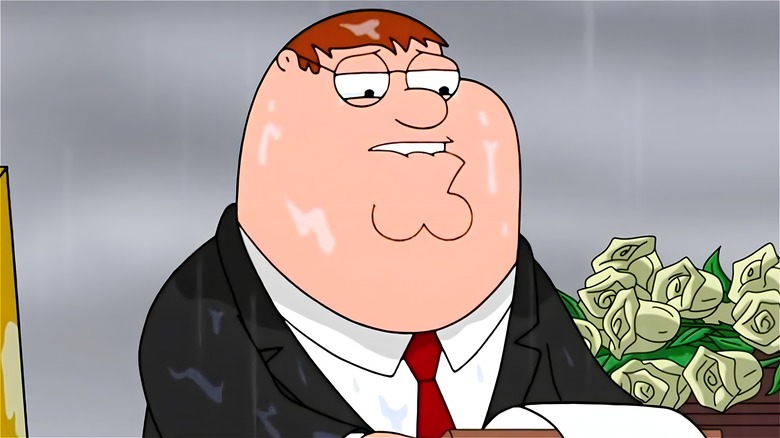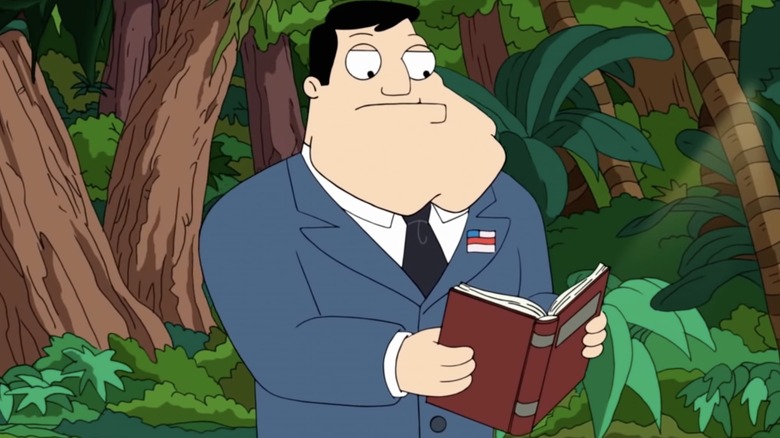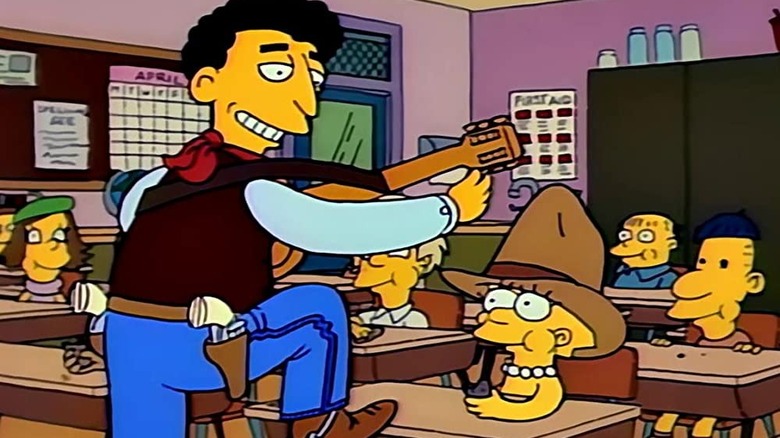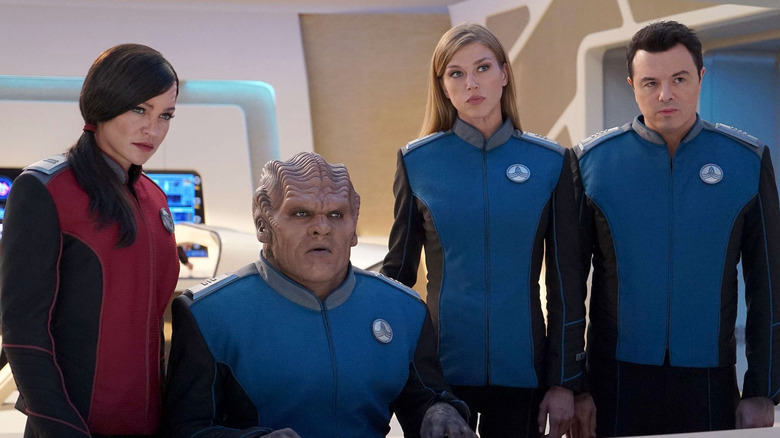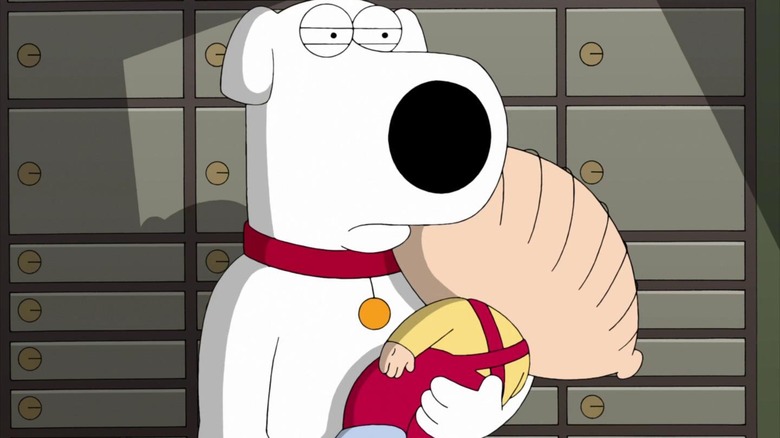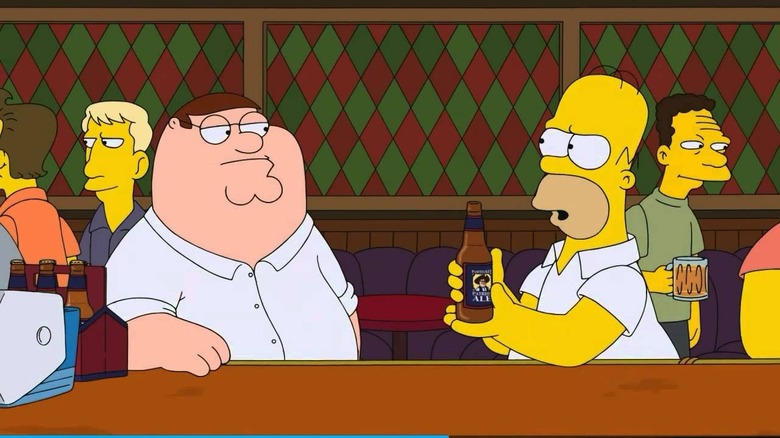Every Seth MacFarlane Animated Series Has The Exact Same Problem
This article contains mentions of suicide.
Seth MacFarlane has truly come to dominate the adult animation landscape. Few could've seen it coming. When "Family Guy" first hit TV in 1999, faced an early cancelation, and was rescued by surprisingly popular reruns on Adult Swim, it seemed destined to be a cult favorite, at most. However, when those reruns, combined with impressive DVD sales, convinced Fox to give it another go, "Family Guy" expanded from a relatively obscure series into a genuine pop culture phenomenon. The show's success also gave MacFarlane leeway to explore other projects, namely the political-skewing "American Dad," as well as a direct "Family Guy" spin-off, "The Cleveland Show," which ran for four seasons.
Even after "The Cleveland Show" ended, "Family Guy" and "American Dad" are still going strong, proving MacFarlane has some gas left in the tank. However, at this point, while the remaining two shows clearly have strong fanbases, one can't help but feel as though they're on a lower echelon of adult animation.
"The Simpsons" remains a perennial favorite. "South Park" still makes headlines for its crass storylines. Even "Rick and Morty" generates online activity of the sort "Family Guy" could only dream of. Meanwhile, MacFarlane's particular brand of shows is just fine, but there's something constantly holding them back from achieving true greatness. It's the one ingredient that makes a difference between being comedic background noise versus claiming a spot as one of the true great adult animated sitcoms. It's something called heart — a quality that "Family Guy" and its ilk have lacked from the start.
Even sitcoms like Family Guy need pathos
"Family Guy," "American Dad," and "The Cleveland Show" all have very funny moments. No one's denying that. Often, these jokes deconstruct well-worn bits of pop culture history, like in "Family Guy," where Peter flies away on his Hindenpeter, a giant blimp that promptly explodes, causing his neighbor Joe to yell out, "How can you afford these things?" It's a joke on top of a joke making fun of how sitcom characters usually have access to unlimited funds so that they can do whatever zany antics they need to do for the sake of the episode.
The problem here isn't humor, though. Shows like "Futurama" and "Rick and Morty" toss out jokes just as funny as those on "Family Guy." What these other animated series have that MacFarlane's offerings lack, above all else, is genuine emotion.
Without a strong hook, all the jokes in the world amount to nothing more than meme fodder. It's a joke that's funny at the moment, sure, but it doesn't last long in the viewer's memory because there's nothing to ground it. This is particularly the case with "Family Guy," which made a name for itself with cutaway gags that literally have nothing to do with the plot. "American Dad" and "The Cleveland Show" put their own spins on this formula: "American Dad" contained more political humor (and in later seasons went full dark humor with body horror aplenty), while "The Cleveland Show" made a niche for itself as a throwback to spin-offs of the past. But the thing that prevents these shows from breaking the proverbial glass ceiling into adult animation greatness is anything emotional. There's no reason for audiences to sincerely care about the characters, their struggles... or their jokes.
Shows like The Simpsons stick with you because you care about the characters
Does anyone actually care about Peter Griffin as a human being, or does he exist merely as a joke machine? Gags may be enough for some, but true greatness is achieved when a cartoon character extends beyond their medium to make you genuinely feel for them between the bits.
This is something "The Simpsons," the predecessor to "Family Guy," achieved to a phenomenal degree in its early seasons. Episodes like "Lisa's Substitute" and "Bart Gets an F" made viewers genuinely care about these characters. There are plenty of jokes in "Lisa's Substitute," like when Lisa takes Homer to the museum, and he makes a baboon out of himself, but those jokes have added layers because Homer's ineptitude is juxtaposed by Lisa having an actually decent father figure in the form of Mr. Bergstrom. The episode has stood the test of time because audiences latch onto more than just random gags. Viewers connect with Lisa's character arc because perhaps they remember a time when they connected with someone who finally understood them. Those emotional moments create stronger bonds with viewers.
Such moments also create stronger rewatch value. Watching a random "Family Guy" episode will result in diminishing returns, because you know when a joke is coming, and it's probably not going to be as funny the first time you saw it. But the emotion from "Lisa's Substitute" always remains palpable because it strikes something deeper.
There's a line in "Family Guy" where Peter says, "We act like we didn't take a lot from the Simpsons. We took a lot from the Simpsons." It seems as though instead of taking plotlines and character archetypes from "The Simpsons," they should've taken those emotional stakes.
The Orville proves Seth MacFarlane can invest heart into a series - but why not on his animated programs?
When "The Orville" was first announced, it would've been easy to assume it would follow the same trajectory as Seth MacFarlane's other projects. It had all the makings of being a sci-fi comedy that lampooned the tropes found in "Star Trek." And there are definitely jokes at that property's expense. At the same time, there's also something unusual about this show — it actually hits you in the feels.
One of the most poignant moments from the show comes when Isaac (Mark Jackson), a non-biological lifeform incapable of emotions, actually gains the ability to feel. In a brief time, he's able to express his love and admiration for Claire (Penny Johnson Jerald) in one of the most heartbreaking and cathartic moments in the show. It's a scene that sticks with you, long after watching. The drama doesn't take away from the comedy. If anything, it enhances it. It makes viewers appreciate the jokes that come later because after such moments, they feel far more connected to these characters. The jokes come from a genuine place, where they feel like they're coming from someone with a distinct point of view, as opposed to the Peter Griffin effect, where they're saying random things for the sake of being random.
Another problem is that, by now, genuine emotion in Family Guy feels out of place
All that said, it's not like "Family Guy" and "American Dad" are devoid of emotion. It's just rare, and when it does materialize, it feels out of place. Case in point: "Brian & Stewie" from Season 8. It's a bottle episode where Brian and Stewie get trapped in a bank vault and reveal dark truths about themselves. There's actually a great deal of pathos here, culminating in Brian revealing how he keeps a gun in his safety deposit box in case he ever wants to die by suicide. It's definitely serious, but coming so late in the show's run, it ends up feeling like it doesn't mesh with the rest of the series, as things bounce right back to carefree cutaways one episode later.
If you Google most hated "Family Guy" episodes, you'll usually find "Brian & Stewie" listed. It comes so out of left field that it can't make a lasting impression. Any pathos is also (seemingly intentionally?) foiled by the show's obsession with gross-out humor, particularly when Brian eats Stewie's feces so that he can have a clean diaper. It's almost as though the show wants to remind the audience, "Hey, this is still 'Family Guy,' don't get too emotional!"
It's an episode that tries to be something more than a standard "Family Guy" episode, but ends up feeling like nothing. And that's because for season after season, rather than go for emotional relatability, "Family Guy" throws everything at the wall to see what sticks. Depression. Bloody wounds. And even when it occasionally goes dark, like this episode, the storyline still just feels like it's winding viewers up for a punchline rather than attempting to strike at some emotional truth.
If you or anyone you know is having suicidal thoughts, please call the National Suicide Prevention Lifeline by dialing 988 or by calling 1-800-273-TALK (8255).
There's more to sitcoms than merely jokes, and Seth MacFarlane's shows need to remember that
Imagine a friend telling you a "Man walks into a bar" joke. It's humorous, you have a laugh, and you move on with your life. There's nothing wrong with getting someone to laugh; it's one of the purest joys in life. However, sitcom episodes have 22 minutes to fill, and during that time, they should ideally make jokes and tell a compelling narrative, to get you to care about the characters. Seth MacFarlane's animated projects succeed in the former and regularly stumble with the latter. Characters fill archetypes, and they tell jokes within those confines.
When it comes to writing, there are two ideas to play with, especially when it comes to comedies. There's pathos, which involves influencing a person's emotions to elicit empathy and sadness. There's also bathos, which alters a serious circumstance to create a ridiculous effect. "Family Guy" and other shows of its ilk are great at bathos. They'll set up seemingly important situations only to undercut them with jokes. But there's no pathos to make viewers empathize with the characters. The Griffin family sitting on their couch at the end of the episode to go over the lesson for the day isn't enough. There needs to be something for audiences to grasp onto, and for the most part, MacFarlane's animated shows don't have that.
As such, they remain amusing ways to kill 30 minutes. Viewers have some good laughs, perhaps a meme comes out of the plot, but there's nothing else. The audience doesn't feel anything about what they just saw, so it becomes mindless entertainment. Perhaps that's enough for some, but there's a real art to making people laugh and getting them to break down crying because a little girl opened a letter reading, "You are Lisa Simpson."
